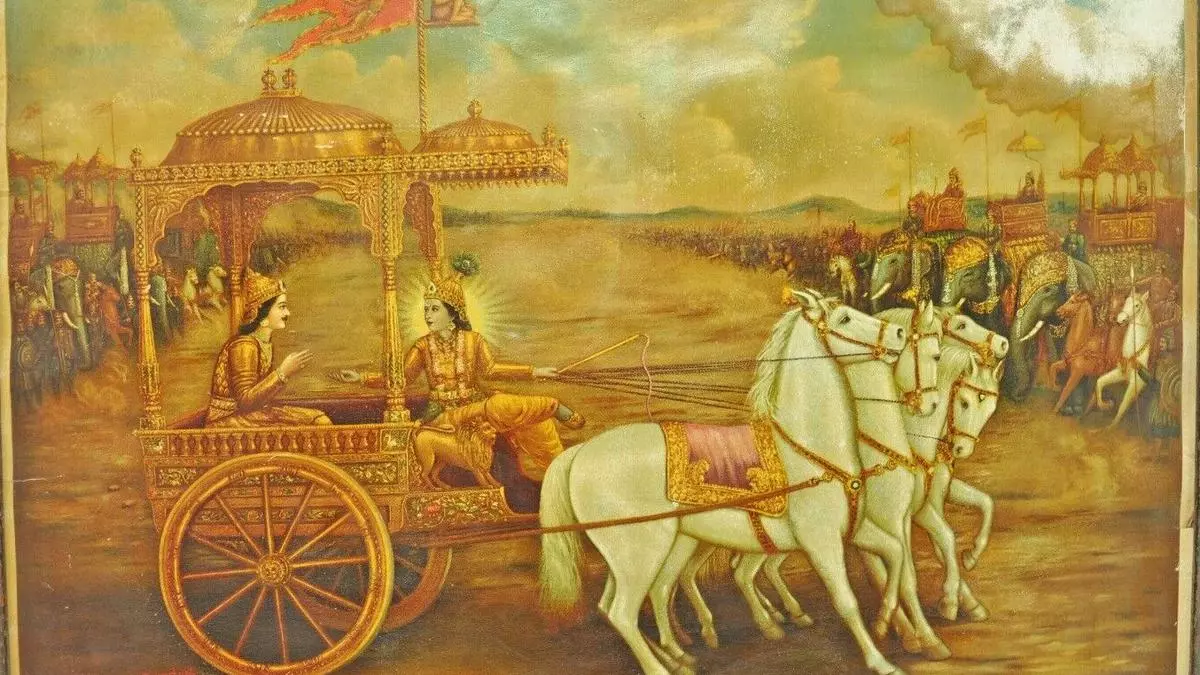The Mahabharata, the epic poem of ancient India, is a timeless saga of family, duty, and dharma (righteous conduct). Woven within its vast narrative are intricate episodes that illuminate the complexities of human relationships and the subtle interplay of fate and free will. One such episode, brimming with symbolic significance, unfolds during Krishna’s peace mission to Hastinapur, the capital of the Kauravas, on the eve of the Kurukshetra War. It is a tale where the simple act of dining transforms into a powerful statement of allegiance and a pivotal moment in the epic’s unfolding drama.
A Delicate Mission
Krishna’s arrival in Hastinapur is not merely a social call; it is a desperate attempt to avert a catastrophic war. As the envoy of the Pandavas, Krishna carries the weight of their hopes for peace and the burden of preventing the annihilation of their lineage. The Kauravas, led by the ambitious and power-hungry Duryodhana, have unjustly usurped the Pandavas’ rightful kingdom, pushing the conflict to the brink of bloodshed.
Krishna, revered as an avatar of Vishnu and embodying wisdom and diplomacy, seeks to navigate the treacherous political landscape of Hastinapur. He understands that every action, every word, carries immense weight and could tip the scales towards war or peace.
The Politics of Hospitality
Upon his arrival, Krishna is greeted with all the pomp and ceremony befitting his stature. Duryodhana, eager to display his power and influence, extends a lavish invitation for Krishna to dine with him. This seemingly innocuous gesture is, in reality, a calculated move, laden with political implications.
In the world of the Mahabharata, accepting a meal from someone is not merely a social courtesy; it is a symbolic act of allegiance. By sharing a table, one implicitly acknowledges the host’s authority and aligns oneself with their cause. Duryodhana, acutely aware of this tradition, sees Krishna’s acceptance of his invitation as a strategic victory, a public declaration of support for the Kauravas.

Krishna’s Strategic Refusal
Krishna, however, understands the profound implications of such an act. He politely but firmly declines Duryodhana’s invitation, choosing instead to dine with Vidura, the wise and righteous advisor to the Kuru court. This decision, seemingly a breach of protocol, is a calculated move that exposes the heart of the conflict and underscores Krishna’s unwavering commitment to dharma.
By refusing Duryodhana’s hospitality, Krishna sends a clear message: he does not endorse the Kauravas’ unjust actions and stands firmly on the side of righteousness. His choice is not a rejection of the Kauravas themselves but a condemnation of their unrighteous path.
The Significance of Vidura’s Home
Krishna’s decision to dine with Vidura further amplifies his message. Vidura, though a Kaurava by birth, is renowned for his impartiality and unwavering commitment to dharma. He represents the voice of reason and justice within the morally conflicted Kaurava court.
By choosing Vidura’s home, Krishna aligns himself with these virtues, highlighting that his allegiance lies not with blood ties or political expediency but with righteousness. This act also serves as a powerful reminder to the Kauravas that their actions have alienated even those within their own family who hold dharma above all else.
A Meal with Deeper Meaning
The meal at Vidura’s home is not merely a matter of sustenance; it is a gathering of those who represent the dwindling hope for peace and justice. Kunti, the mother of the Pandavas, is also present, adding an emotional layer to the gathering.
This gathering, though simple, stands in stark contrast to the opulent yet morally bankrupt court of Duryodhana. It is here, in the company of those who value righteousness above all else, that Krishna chooses to break bread.
Beyond the Plate: A Message of Dharma
Krishna’s choice of where to dine in Hastinapur is a masterclass in subtle diplomacy. It is an act laden with symbolism, conveying a powerful message without uttering a single word of condemnation. Through this simple act, Krishna reiterates his unwavering commitment to dharma, exposes the moral bankruptcy of the Kauravas’ position, and offers a glimmer of hope that even in the darkest of times, righteousness will find its champions.
The episode serves as a timeless reminder that our choices, even seemingly mundane ones, can have profound implications. It underscores the importance of aligning ourselves with righteousness, even when it requires challenging those in power and defying societal expectations. In a world teetering on the brink of chaos, Krishna’s actions offer a beacon of hope, reminding us that even amidst darkness, the light of dharma can never be extinguished.

